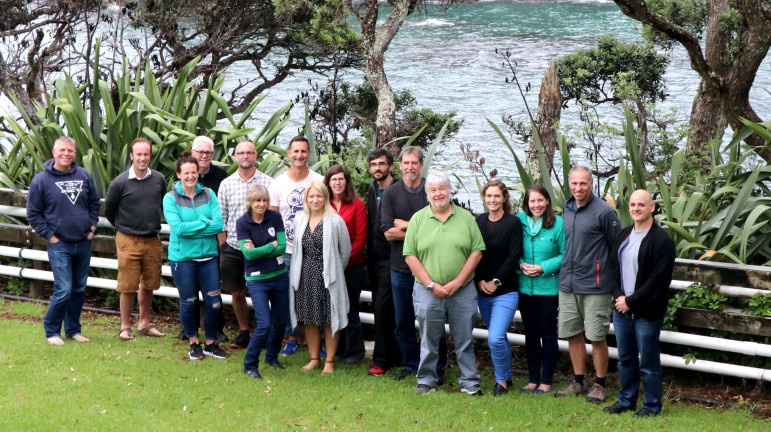Posted on 22 April 2024
Aotearoa scientist and team recognised by international sustainability body for their work in preventing ecosystem collapse
- Media release
- 3 Minutes to read
There’s no better time than Earth Day (22 April) to celebrate a University of Auckland scientist and her team’s achievement as the National Champions of the Frontiers Planet Prize.
The research, funded by Sustainable Seas and Biological Heritage National Science Challenges, was considered award-winning for the way it connects key actions across research, policy and management of environmental issues in land, water and seas. These actions are designed to stop ecosystems collapsing.
“We cannot manage our land, water and seas in silos. Ecological tipping points are connected and happen across different time scales,” explains lead researcher Rebecca Gladstone-Gallagher. “Our research shows how we can use this knowledge to make quicker, more potent, management decisions that connect ecological and social interactions. Ultimately, these actions will helps us save ecosystems worldwide.”
Around the globe, 23 National Champions have been chosen, of which Rebecca is one. All now move forward to the final round of the competition, where three International Champions will be awarded $1.8mNZD each to support further research.
The findings were recognised for the way they highlighted the need for understanding the consequences of managing ecosystems in isolation of other connected ecosystems. For example, land-uses are managed independently, without considering the distant effects caused in estuaries and coasts. This slows down actions to mitigate environmental problems in the sea. These slow responses lead to rapid losses of valuable ecosystem resources and services, and such tipping points are extremely difficult to return from.

Image: The research team at a workshop in 2019 in Leigh, New Zealand. The workshop brought together cross-disciplinary and cross-ecosystem domain experts from multiple countries to discuss critical issues to sustainability that arise from the sectoral nature of science and governance. From the left: Alf Norkko, Steven Lade, Helen Warburton, Richard Le Heron, George Perry, Judi Hewitt, Daniel Hikuroa, Johanna Yletyinen, Suzie Greenhalgh, Vasilis Dakos, David Schiel, Simon Thrush, Emily Douglas, Rebecca Gladstone-Gallagher, Conrad Pilditch, Jason Tylianakis. Absent from photo: Ewa Siwicka.
Aotearoa has recently experienced a real-world example of the consequences of not connecting up management decisions across land, water and seas. As a result of massive soil erosion on the east coast of the North Island during Cyclone Bola (1988), hillsides were retired from grazing and used for plantation forestry to stabilise the land. Fast forward three decades and a large proportion of the forest reached harvest simultaneously. The exposed soil associated with clear felling was left draped in woody debris to protect the soil from rain. However, when Cyclone Gabrielle (2023) caused extreme rainfall, it washed both soil and woody debris into the stream network, disturbing habitats, transporting vast amounts of silt and destroying low land farms and critical infrastructure. This debris also clogged the harbours and coastal beaches, smothered sea floor habitats destroying fisheries and impacted cultural and recreational values.
"This real-world example demonstrates the severe consequences of lags in information flow and management responses,” says Rebecca. “If land use management decisions had been connected to the impacts of what would happen at sea, the outcomes could have been very different.”
This is the second time Frontiers Planet Prize has been award. The prize was developed by the Frontiers Research Foundation to directly address the planetary crisis. It does this by acknowledging and funding scientists to conduct breakthrough research that provides the greatest potential of stabilising the planet’s ecosystems.
Read the full research paper here.